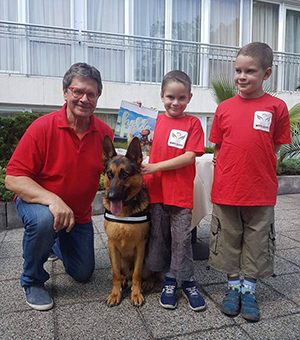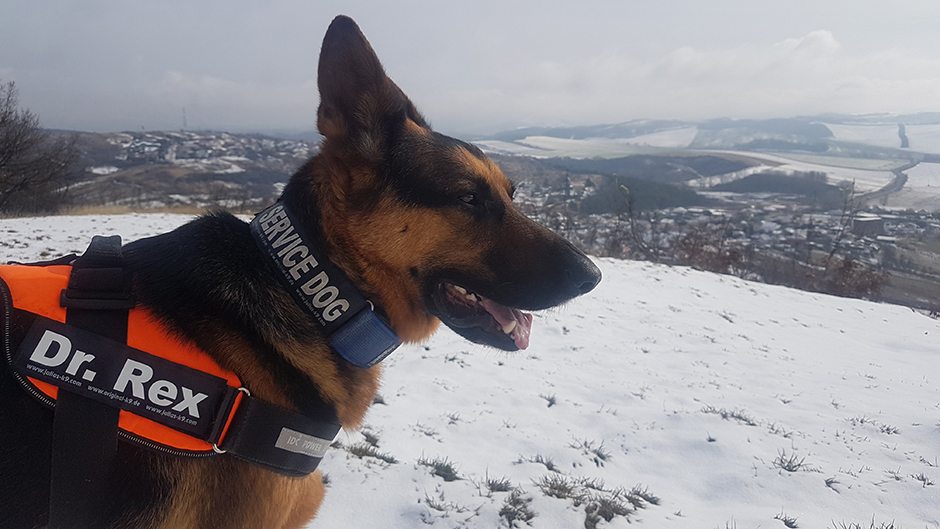Recently, the media has focused on a paediatrician in Budapest, who once decided to take his four-legged pet Rex, a German Shepherd, with him to the surgery. It was both a success and a scandal. It was welcomed as much as it was frowned upon. However, its success is unquestionable. That is why we asked Dr. Károly Varga to tell their story.
Is it true that you received Rex for therapeutic purposes?
– Yes, I was going through a very bad, difficult phase in my life when Rex became my companion, and he managed to save me, because I was heading downhill fast. When I think back to it, sometimes even I myself wonder what a huge gift my dog was to me four years ago. I knew that service dogs exist, but when you experience the effect of such a wonderful animal on your own skin, it is not comparable to reading about it in books. In addition, you also learn about things such as responsible pet ownership.
Was it primarily for practical reasons that you took Rex to the surgery?
– Absolutely, in the beginning. I didn’t want to leave him alone at home, I knew he was not an excited dog and would lie around quietly in the surgery. And then I noticed how good an effect he had on the children visiting me. As soon as they saw the dog, they forgot that they were visiting a doctor. Moreover, Rex is an incredibly stable and balanced dog, and this radiates over to the children, who are more sensitive to such things than adults.

Most children are afraid of visiting the doctor. Do they have bad memories of doctors?
– Bad memories are always more lasting, and in addition we vaccinate children from a very early age. When they visit a doctor, they have to leave their comfort zone, and they have no choice, as they are taken by their parents. That’s why I prefer to visit my little patients at their homes. They are more balanced there, especially if I take my dog with me. Anyway, most adults also find it hard to visit a doctor. No one likes to wait in a crowded room, and the manners of some colleagues only make matters worse. Therefore, many people turn to doctors for help only when they are already in a serious condition.
When it turned out that you take your dog to the surgery, many were opposed to it, despite the positive effects. What do you think about that?
– I can accept the opinions and views of those, who are engaged in the training of service and therapy dogs, who work with such dogs, since in the beginning, Rex only had a basic training. Those, who only speak from malice and fear of the new and unknown, are another matter. I definitely wanted to train my dog, because I thought, and still think that it is necessary. In my view it is a part of responsible pet ownership. The authority allowed Rex to stay in the surgery as a service dog, therefore, we took part in further training. I did not know what to expect, since by that time, Rex was already 3 years old, and service dogs start their training as puppies. I think it is a small miracle that my dog was receptive to training at that age, and managed to acquire the skills, that made him a service dog.
The two of you are a very special couple, as you are a therapist, and Rex is a service dog.
– I often think of this too. I’m doing therapy as a doctor, and my dog helps me in this, but he is not a therapy dog yet, despite we still do our work together.

Are you aware of any other paediatrician in the world who has tried this?
– I could not find any article, document or anything on it. Of course I do not mind, if we are not the first alike duo. Perhaps there will be more of us in the future. I have already been contacted by doctors and dentists to talk about this. I am happy to help everyone who is interested in our work. That is why, we took advantage of the popularity of Rex, and have established the Dr. Rex Dog Association, to collect donations for sick children and animals. In addition, we would like to find the scientific basis for the work we are doing with Rex. We also seek specialists (psychologists, ethologists, etc.), to document the work and help offered by the dog, in an appropriate manner and form, so we can share it with others if necessary. We would like to present our method at a medical congress. It would also be good to gain more rights for service dogs, because, for example when I go to a non-dog friendly shopping centre with Rex, I’m stopped on each floor at least once by a security guard, and I have to show repeatedly the documents proving that Rex is a service dog. Another aim of ours is to create harmony between dog owners and non-dog owners. I always say that everyone has the right to be afraid of dogs, or even not to like dogs, but does not have the right to hurt them, and that should be punished rigorously. Dogs cannot be forced on anyone, that would only result in even greater resistance.
Could this kind of dog therapy become a patented Hungarian invention?
– Why not, actually I have two goals right now. I would like everybody in the world to know, that this method is effective and it works. Of course, if someone chooses to do this, there are many conditions to be fulfilled, many requirements to be met. This is a difficult path, because it requires an absolutely stable dog, who is clean, healthy, tolerable and, of course, has the appropriate qualifications. Moreover, the doctor has to get along well with the dog, because otherwise the whole thing is worthless. The doctor and the dog has to form one unit.

In addition, I would be pleased if we could spread stress-free healing in Hungary, both for children and adults. Not necessarily with the help of dogs or other animals, though. It could be a showroom-clinic or any other innovative solution, so that people are not afraid of visiting a doctor, or won’t have bad innervations, won’t feel vulnerable and uneasy, since we do not go to the doctor for fun. We are often worried for ourselves or our child. I would like to make necessary doctor visits not more of an ordeal than, let’s say an everyday shopping trip.

While talking with Dr. Károly Varga, I felt throughout, that this man is filled with an incredible intent to help, accompanied by childlike enthusiasm. It is said that a dog is the only thing on earth that loves you more than he loves himself. And that is exactly what I felt with Dr. Károly Varga, that he loves his companion, his colleague, more than he loves himself. Walking on the Római Bank, the favourite place of the doctor and his dog, the personality, the goals of the “Doctor with a dog” were so captivating, that I sometimes forgot that I was working. I hope very much that this successful method will reach and help many people.
Gyula Kurkó
The article was published in the journal of the Hungarian Kinological Society at the end of 2017
